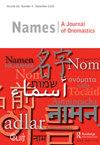Birth Order, Gender, and Naming Preferences in Contemporary Poland
IF 0.6
3区 文学
0 LANGUAGE & LINGUISTICS
引用次数: 0
Abstract
The paper investigates how birth order and gender jointly influence naming decisions among Polish parents. The impact of birth order on the choice of first names has been extensively documented in historical and anthropological studies worldwide, but it has been largely ignored in sociological research on contemporary Western countries. The study is based on a survey of 317 users of a Polish parenting forum devoted to first names and naming decisions. The names of the first-born and second-born children of the research participants are compared in terms of their popularity and traditionality, measured both objectively and subjectively, in regard to the subjective motives declared behind the naming choices. The findings show that, on the whole, the first-born children received more popular and more traditional names than the second-borns. However, when the gender of the children was figured in, the difference between the first-born and the second-born boys turned out statistically significant only in the dimension of traditionality, whereas between the first-born and the second-born girls, only in the dimension of popularity. In a within-family comparison, the names given to siblings were found to be fairly consistent in both dimensions, and the gender of the first child influenced the preferences for the second one, especially if the latter was a girl. Those results can be interpreted in the frame of different social expectations towards the genders, with a particular focus on gendered concepts of the self.当代波兰的出生顺序、性别和命名偏好
本文调查了出生顺序和性别如何共同影响波兰父母的命名决定。出生顺序对名字选择的影响在世界各地的历史和人类学研究中得到了广泛的记录,但在当代西方国家的社会学研究中却基本上被忽视了。这项研究基于对波兰一个专门讨论名字和命名决定的育儿论坛的317名用户的调查。研究参与者的第一个和第二个孩子的名字根据其受欢迎程度和传统性进行了比较,无论是客观还是主观,都根据命名选择背后的主观动机进行了衡量。研究结果表明,总的来说,第一个孩子的名字比第二个孩子的更受欢迎,也更传统。然而,当考虑到孩子的性别时,第一个出生的男孩和第二个出生的女孩之间的差异仅在传统性方面具有统计学意义,而第一个出生和第二次出生的女孩仅在受欢迎程度方面具有统计学显著性。在家庭内部比较中,发现兄弟姐妹的名字在两个维度上都相当一致,第一个孩子的性别影响了对第二个孩子的偏好,尤其是如果后者是女孩的话。这些结果可以在对性别的不同社会期望的框架下进行解释,特别关注性别化的自我概念。
本文章由计算机程序翻译,如有差异,请以英文原文为准。
求助全文
约1分钟内获得全文
求助全文
来源期刊

Names-A Journal of Onomastics
Multiple-
CiteScore
1.30
自引率
50.00%
发文量
23
期刊介绍:
Names, the journal of the American Name Society, is one of the world"s leading journals in the study of onomastics. Since the first issue in 1952, this quarterly journal has published hundreds of articles, reviews, and notes, seeking to find out what really is in a name, and to investigate cultural insights, settlement history, and linguistic characteristics revealed in names. Individuals subscribing to Names automatically become members of the American Name Society and receive the journal as part of their membership.
 求助内容:
求助内容: 应助结果提醒方式:
应助结果提醒方式:


